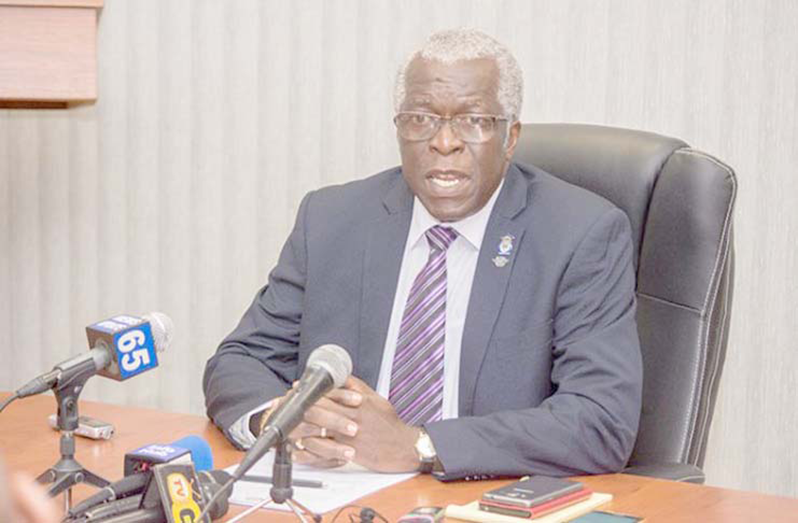— penalties for breaches to COVID-19 measures at airports
— facilities equipped and ready for reopening, says Field
— airlines ‘informally’ signal intentions to return; still to apply for recommencement of operations
By Navendra Seoraj
AS cases of the novel coronavirus (COVID-19) continue to rise globally and locally, safeguarding the health of Guyanese through the enforcement of COVID-19 control measures and penalties will be a top priority for authorities, as they move to reopen airports after October 12, 2020.
The emergency measures were made pursuant to paragraphs (1) and (2)(b) of the Direction by the President, given under the Public Health Ordinance, Cap. 145, and published in the Gazette, Legal Supplement –B, March 16, 2020.
According to health authorities, the COVID-19 Emergency Measures (No. 8) will expire on October 31, 2020, unless earlier terminated, extended or amended by notice of the Minister of Health, after an assessment of the prevailing public health conditions.
All stakeholders who flout those measures will be held accountable and even be penalised for their actions, said Director-General of the Guyana Civil Aviation Authority (GCAA), Lt. Col. (Ret’d) Egbert Field, during an exclusive interview with the Guyana Chronicle.
“We will be enforcing it [the measures] rigidly, because we do not intend to have aviation tarnish the health of individuals… so we will be playing our part and we expect aircraft operators, airports, aircraft handlers and travellers to play their part in ensuring measures are strictly adhered to,” said Field.
Speaking about the role of airlines, the director-general said carriers will have to ensure that passengers adhere to measures which include wearing a mask, social distancing and sanitising. Also, companies would have to ensure that their aircraft are sanitised between flights, and that all regulations which have been gazetted are adhered to.
“All of this is being done so we could not just have a reopening of the airports, but a successful reopening… we do not just want to be opening the doors wide without strict measures and penalties… yes, there are penalties for non-adherence and non-compliance, and they will be rigidly enforced,” said Field.
Guyana’s two international airports, the Cheddi Jagan International Airport and Eugene F. Correia International Airport have been closed to incoming commercial, international flights since midnight on March 18, after Guyana recorded its first COVID-19 case on March 11.
The airports were initially scheduled to close for a two-week period; however, as COVID-19 cases in the country increased, the closures continued to be extended.
When asked what led to the recent decision to reopen the airports, Prime Minister Brigadier (retired) Mark Phillips had said the ‘demand’ for reopening the airports was what prompted discussions related to this topic.
Field confirmed that all protocols for the reopening have been finalised, and it was decided that passengers would not be allowed to travel to Guyana unless they have a negative COVID-19 result from a Polymerase Chain Reaction (PCR) test. Ideally, the test will have to be done within 72 hours, but once it is slightly over that time, persons will have to be tested upon arrival into Guyana.
TESTED AGAIN
According to Field, passengers who produce test results which are between four and seven days old, will be tested on arrival at either of the two airports.
In talking about the procedure, he said: “Should they [passengers] prove negative, they can proceed to their homes with no isolation and if they test positive, they will be subjected to 14 days of quarantine.”
This and other measures will be applicable to both regional and international passengers. In terms of physical preparedness, Field said both airports are equipped and ready for the reopening.
Authorities recently conducted a “walkthrough” at the airports and observed that there are adequate sanitisation materials, social-distancing markings and measures to keep employees of those facilities protected at all times.
With preparations in place and established measures, it is now left for airlines to apply to the Guyana Civil Aviation Authority (GCAA) for approval to recommence operations.
Field said American Airlines, Copa Airlines and Caribbean Airlines have all signalled informally their intention to recommence operations, but they have not formally applied.
“When they do [formally apply], the GCAA will then have to review and assess their requests as to frequency and time of operations and then dictate what times they will be able to operate,” said the director-general.
It was reported in August that the Government of Guyana brought home over 2,000 Guyanese, including students, who were left stranded overseas as a result of the closure of airports, in an effort to combat the spread of COVID-19.
There have since been flights from New York, Miami, Cuba, Trinidad and Tobago, Barbados, Canada, St. Maarten, Jamaica, Grenada and Curaçao.
According to the World Health Organisation (WHO), there are 34.7 million cases of COVID-19 globally, and while 24.1 million persons have recovered, 1.3 million persons have died.
The WHO has defined COVID-19 as an infectious disease caused by a newly discovered coronavirus. Most people who fall sick with COVID-19 will experience mild to moderate symptoms and recover without special treatment.
The WHO had said that 81 per cent of the persons who contract COVID-19 will have mild symptoms, while 14 per cent will have severe ones, and five per cent will need intensive care.
In Guyana, health authorities have so far tested 15,078 persons, with 11,552 proving negative, and 3,188 positive.
While 1,972 persons have recovered from this disease, 90 persons have died and there are 1,107 active cases which include 137 persons in institutional isolation, 975 in home isolation, and 14 in the COVID-19 ICU.
In view of these numbers, persons are being encouraged to take extra precautions because there is no approved cure or specific treatment for the disease. Guyanese were also reminded to observe the protocols established in the COVID-19 emergency measures.












